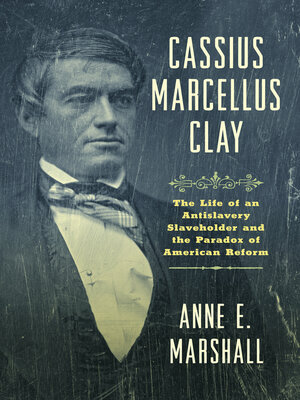Cassius Marcellus Clay
ebook ∣ The Life of an Antislavery Slaveholder and the Paradox of American Reform · Civil War America
By Anne E. Marshall

Sign up to save your library
With an OverDrive account, you can save your favorite libraries for at-a-glance information about availability. Find out more about OverDrive accounts.
Find this title in Libby, the library reading app by OverDrive.



Search for a digital library with this title
Title found at these libraries:
| Library Name | Distance |
|---|---|
| Loading... |
The nineteenth-century Kentucky antislavery reformer Cassius Marcellus Clay is generally remembered as a knife-wielding rabble-rouser who both inspired and enraged his contemporaries. Clay brawled with opponents while stumping for state constitutional changes to curtail the slave trade. He famously deployed cannons to protect the office of the antislavery newspaper he founded in Lexington. Despite attempts on his life, he helped found the national Republican party and positioned himself as a staunch border state ally of Abraham Lincoln. During the Civil War, he served as US minister to Russia, working to ensure that European allies would not recognize the Confederacy. And yet he was a slave owner until the end of the Civil War. Though often misremembered as an abolitionist, Clay was like many Americans of his time: interested in a gradual end to slavery but largely on grounds that the institution limited whites' ability to profit from free labor and the South’s opportunity for economic advancement. In the end, Clay’s political positions were far more about protecting members of his own class than advancing the cause of Black freedom.
This vivid and insightful biography reveals Cassius Clay as he was: colorful, yes, but in many ways typical of white Americans who disliked slavery in principle but remained comfortable accommodating it. Reconsidering Clay as emblematic rather than exceptional, Anne E. Marshall shows today’s readers why it took a violent war to finally abolish slavery and why African Americans' demands for equality struggled to gain white support after the Civil War.
This vivid and insightful biography reveals Cassius Clay as he was: colorful, yes, but in many ways typical of white Americans who disliked slavery in principle but remained comfortable accommodating it. Reconsidering Clay as emblematic rather than exceptional, Anne E. Marshall shows today’s readers why it took a violent war to finally abolish slavery and why African Americans' demands for equality struggled to gain white support after the Civil War.







